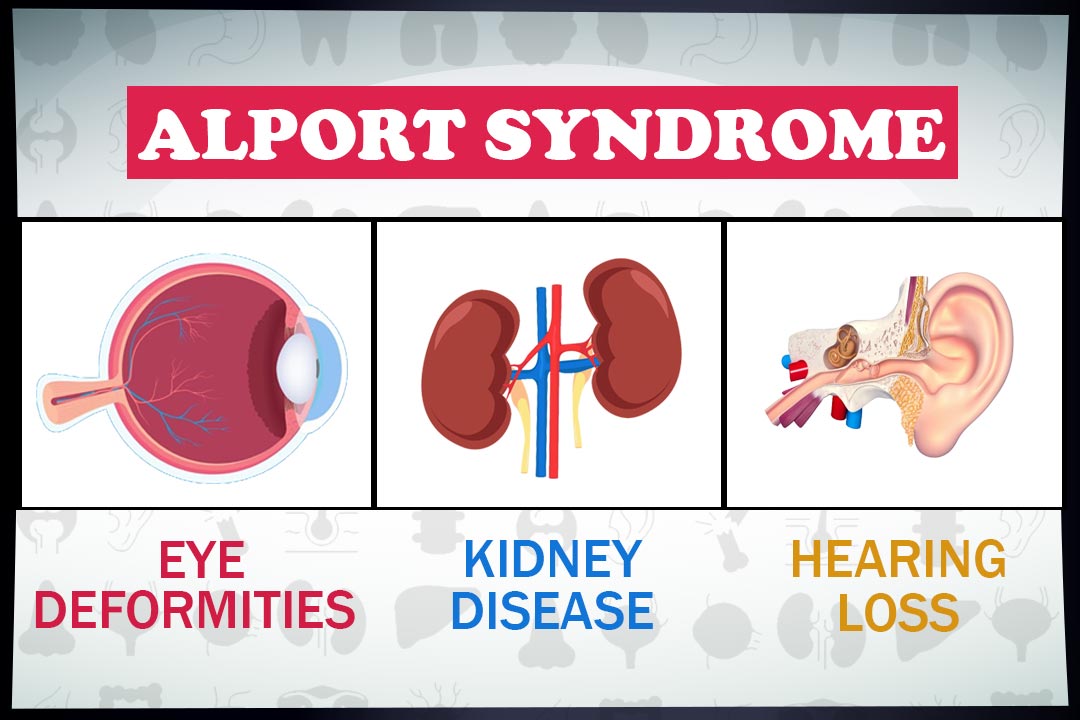What is alport syndrome?

Alport syndrome is a type of inherited disease resulting in compromised kidney function, hearing loss, and eye abnormalities. The damage to the kidney function is so severe that it may result in high levels of protein in the urine and also end-stage renal disease. Individuals having Alport syndrome in their early adolescence or late child primarily develop sensorineural hearing loss because of abnormalities in the inner ear. They may also end up having anterior lenticonus and unusual coloration of the light-sensitive tissue at the end of the retina leading to low vision. However, the signs appear to be more common in males than it affects females.
In most cases, the disorder is caused by alterations in the genes, and so diagnose is based on the family history of kidney disease, signs, and some tests. Alport syndrome mostly occurs among 1 in 50,000 newborns.
Symptoms of Alport syndrome
The symptoms of Alport syndrome begin in early childhood, and the first sign that can be seen is the blood in the urine. The other common signs that may prevail during this condition is the leakage of a protein called albumin along with the urine that gives rise to swelling in the body. With protein loss, the patients also notice bone getting weakened, joints paining, and some extreme cases even progress to renal failure.
Alport syndrome also causes specific changes in the visibility of the patient. Anterior lenticonus usually appears when the lens becomes cone-shaped, the damage to the macula results in central vision.
Also note that for patients, the signs may vary from condition to condition, and individuals may not have all the symptoms at once.
Common symptoms that most of the patient’s face are:
- Glomerulopathy
- Hematuria
- Retinopathy
- Morphological abnormality of the semicircular canal
- Sensorineural hearing impairment
- Stomach pain
- Low kidney function
- Proteinuria
- Hypertension
- Swelling in the body
Inheritance pattern of Alport syndrome
There is no fixed inheritance pattern of Alport syndrome. Most cases of Alport syndrome are manifested because of mutations in the COL4A5 linked to the X pattern found in the X chromosome. The males who have only one copy of the X chromosome, the defected copy of the COL4A5 gene in each of the cells, the condition can result in kidney failure while in females (with two X chromosomes); the mutation in the COL4A5 gene only prompts hematuria. The characteristics of the X-linked inheritance is that the condition that any father cannot pass the X-linked traits to their babies.
The other less common cases of Alport syndrome result from the alteration in both the copies of the COL4A3 and COL4A4 gene (primarily known to be an autosomal recessive pattern). Both the parents have one copy of the mutated gene and are known to be the carriers. Some carriers do not get affected with Alport syndrome; rather, they have some of the signs such as hematuria.
In about 5% of the cases of Alport syndrome, there is an autosomal dominant inheritance pattern caused by a mutation in either of the COL4A3 or COL4A4 in each of the cells.
Diagnosis and treatment of Alport syndrome
To diagnose Alport syndrome, you should go for the following tests:
- Urinalysis
- BUN/creatinine test
- Blood tests
- Hematuria test (check for blood in the urine)
- Audiometry (tests ability to hear)
- Kidney (renal) biopsy
There is no specific treatment for Alport syndrome. But there are some ways through which you can manage the signs and complications like high blood pressure, hematuria, and proteinuria.
With the help of Ayurveda, you can slow down the progression of Alport syndrome into some late stages of kidney failure. Not every condition can be cured with the help of dialysis or transplant, for some conditions like Alport syndrome; you can rely on Ayurveda also.
Why diet matters during Alport syndrome
Alport syndrome mainly arises because of some low kidney function. Type four collagen harm the filters of the kidneys called glomeruli due to which the kidneys have a hard time eliminating the waste from the blood. At that time, a healthy diet works on preventing the kidneys from getting burdened. Kidney patients should always watch out the nutrients, they intake as it allows the kidneys to function properly while meeting your bodily requirements.
Is Alport syndrome curable?
The viable treatment to end Alport syndrome can help slow down the progression of kidney disease. But allopathy does not offer a permanent cure for Alport syndrome, and the best choice is to rely on Ayurveda for the betterment of the health. The allopathy holds the treatment in the form of dialysis and transplant, which are costly, painful, and still not a permanent treatment to improve kidney function.
On the other hand, Ayurveda is an alternative approach to cure CKD. The goal of the ayurvedic treatment is to monitor and slow down the progression of Alport syndrome. The ayurvedic medications work on regulating high blood pressure to keep the kidneys healthy and functional. The other conditions, such as proteinuria and hematuria, can also be fought off with the help of Ayurveda.
Call Karma Ayurveda if you wish to know more about kidney problems and their ayurvedic treatment.
